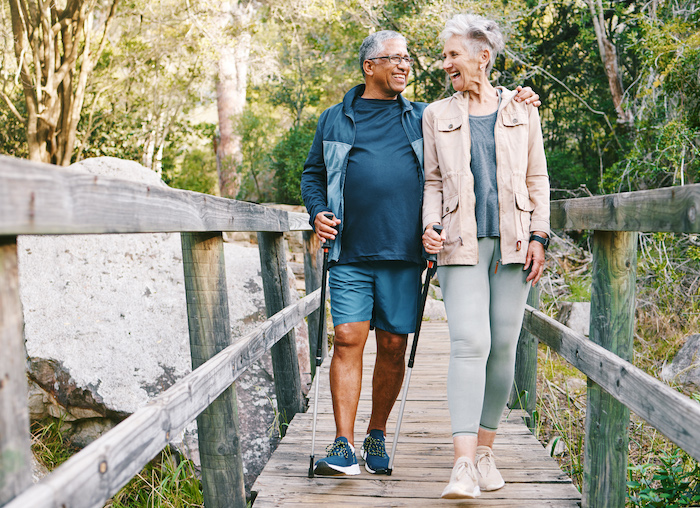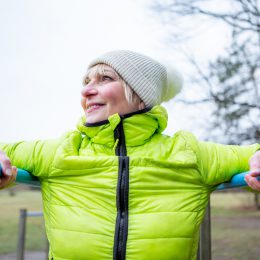How Exercise Can Boost Your Immune System
Cold and flu season is here. Could exercise be your secret to staying healthy?

When it comes to bracing for cold and flu season, the tried-and-true advice still holds true: Wash your hands more often, focus on plenty of quality sleep, get a flu shot, eat fruits and vegetables, and make sure you’re hydrated enough.
There’s one more item to add to this prevention list, and that’s exercise.
“The connection between healthy habits, including physical activity and stronger immune function can’t be overstated,” says Vivek Cherian, M.D., a Baltimore-based internal medicine physician. “What you do every day can have a major impact on fighting off viruses and infections, and as with anything in medicine, prevention is the preferred approach.”
With that in mind, here’s a look at how exercise strengthens the immune response, and whether that means you should stay active when you do get sick.
Add SilverSneakers to your wellness routine! Classes and events are happening daily at participating gyms, online through SilverSneakers LIVE, and at community centers near you. Activate your free online account to get started.
How Exercise Impacts the Immune System
A breadth of research links regular physical activity with better immune function, for people of all ages, says Dr. Cherian. For older adults, exercise may even mitigate some age-related changes that tend to lower immunity.
A study in Frontiers in Immunology looked at 29 women over age 65 who took part in a six-week exercise program. When researchers compared before-and-after samples of their immune cells, they found that exercise fired up the immune system by producing more threat-fighting cells.
(A bonus result was improvement in the women’s body composition and overall mobility. Win-win!)
In explaining their findings, the researchers noted that age inevitably brings a decline in immune function. It’s a process called immunosenescence. It makes you more susceptible to colds and flu.
Regular workouts, however, have the power to help slow this process considerably, the study showed. This means you not only have better protection against colds and flu, but also against a wide range of other illnesses.
A 2018 research review focusing on immunosenescence, also published in Frontiers in Immunology, noted that exercise can actually improve the effectiveness of flu vaccines in older adults, since the immune system is more efficient.
Another big bonus: Regular exercise helps flush bacteria out of the lungs and airways. This action cuts your chances of catching a cold or flu. What’s more, the slight rise in body temperature that comes when you exercise may even prevent bacteria from growing in the first place.
3 Tips for Maximizing the Immune-Boosting Benefits of Exercise
To reap the immune-boosting advantages of your workouts, follow these strategies:
Be consistent. Getting some physical activity every day can keep the immune system primed and is better than trying to load up all your exercise on the weekend or one day per week.
Move more throughout the day. Although getting to the gym and taking SilverSneakers classes can keep you motivated, remember that all movement can count toward your physical activity total — and the more the better.
For example, housework, walking the dog, playing with grandkids, or gardening are all hobbies that keep you active.
Focus on variety. In terms of the best workout for immune system building, the answer is all of them, says Dr. Cherian. From aerobic exercise like stationary cycling and Zumba Gold to strength training with weights or bodyweight exercises, all types of exercise help build up your immunity. Doing a variety of activities also lets you move in more ways — plus, it keeps exercise fresh and interesting.
Choose workouts that make you feel uplifted and empowered, as that reduces stress, adds Jessica Schatz, RYT, a Los Angeles–based yoga teacher. Chronic or even short-term stress has been shown to have a significant and negative effect on immune function, she explains. And physical activity in general tends to be a stress buster.
Schatz says yoga is a good example of how exercise influences immunity because it connects deep breathing — which has been shown to lower the stress response — with poses that build strength and increase mobility and flexibility.
Subscribe to our newsletter
It's quick and easy. You could be one of the 13 million people who are eligible.
Already a member? Click to discover our 15,000+ participating locations.
Follow Us
“Even just a few yoga sessions per week can be helpful,” she says. “A regular practice can help with immunity, sleep, and stress, and improving all of those can be powerful.”
Should You Exercise When You’re Sick?
Considering that physical activity provides a boost for immune function, it might seem like getting more exercise when you’re starting to feel sick would be advantageous. But it doesn’t work that way, according to Dr. Cherian.
“If you’re symptomatic, which means you have fever, chills, or respiratory issues, you should refrain from exercising,” he says. “It’s best to wait seven to 10 days before you ease back into your exercise routine. Ultimately, the timeframe will be different for everyone, so it’s important to listen to your body.”
When you do return to exercise, he suggests starting gradually, especially if your symptoms haven’t fully resolved. That doesn’t mean no exercise at all — physical activity like walking or gentle yoga can be helpful for getting you back on track. If you have mild symptoms, you may be able to do more, says Dr. Cherian.
“If you have a runny nose but otherwise feel fine, it’s absolutely okay to resume exercising,” he adds. “If you still have some congestion or shortness of breath, I’d recommend holding off. Bottom line is that if you’re unsure, ask your primary care doctor, especially if your symptoms are lingering after 10 days.”
See our sources:
Exercise to mitigate age-related immunity changes: Frontiers in Immunology
Exercise and improved effectiveness of flu vaccines: Frontiers in Immunology
Relationship between exercise and immunity: MedlinePlus
Stress and immune function: Current Opinion in Psychology
Yoga and deep breathing to lower stress, boost immunity: Frontiers in Psychology
Check Your SilverSneakers Eligibility Instantly
SilverSneakers members can go to thousands of gyms and fitness locations across the nation, plus take SilverSneakers LIVE online classes that are designed for all fitness levels. If you have a Medicare Advantage plan, it may include SilverSneakers — at no additional cost. Check your eligibility instantly here.
Already a member? Get your SilverSneakers member ID and exclusive fitness content by activating your online account here.
Not eligible for SilverSneakers? You can still get 200+ free SilverSneakers On-Demand videos and stay in touch with us by creating your online account.





